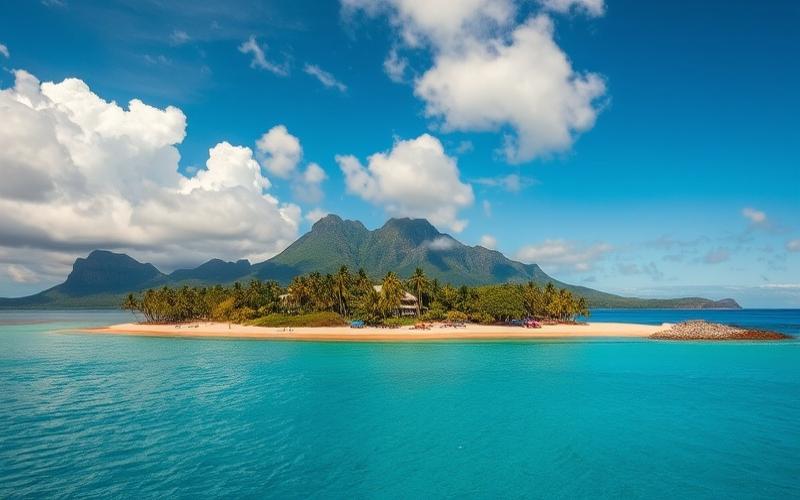
 Published on and written by Cyril Jarnias
Published on and written by Cyril Jarnias
Mauritius, often perceived as a tropical paradise, is also transforming into a laboratory for innovative real estate trends. In recent years, the rise of co-living spaces has captured the attention of young professionals and digital nomads seeking flexibility and community.
Offering a friendly alternative to traditional forms of housing, these shared residences cleverly combine private and common spaces, while fostering a spirit of collaboration and cultural exchange.
This phenomenon is not only revolutionizing the local real estate market, but it also provides a dynamic response to modern challenges of connectivity and sustainable urban living.
The Factors Behind the Rise of Co-living Spaces in Mauritius
Demographics and Social Trends
Population growth in Mauritius is accompanied by a marked evolution in lifestyles, particularly among young professionals, students, and expatriates. These groups are seeking modern, flexible, and community-oriented housing alternatives. Co-living spaces particularly appeal to these groups through their ability to provide a collaborative and dynamic environment in attractive urban neighborhoods like Rose Hill or Moka. This lifestyle meets aspirations for independence while promoting social interactions, a characteristic highly valued by digital nomads.
Key Demographic Factors:
- Increase in the number of young urban professionals
- Growing arrival of expatriates seeking quick integration
- Rising popularity of remote work
Economy and Real Estate Market
The Mauritian real estate market is undergoing a profound transformation due to innovative investment opportunities and challenges from the high cost of traditional housing in attractive areas. The rise of co-living is explained by the need for some real estate players to offer more accessible, adaptive, and profitable models.
Examples:
- Recent projects in Rose Hill offering flexible rental in high-end shared housing
- Investments in hybrid residential properties blending modern private spaces with shared common areas
Comparative Table:
| Traditional Model | Modern Co-living |
|---|---|
| High rents | Shared cost |
| Rigid contracts | Contract flexibility |
| Social isolation | Integrated community |
Technology and Communication
Widespread digital connectivity has profoundly changed work habits: remote work, international freelancing, and digital entrepreneurship are rapidly becoming mainstream in Mauritius. Co-living spaces now often include high-speed internet access, shared offices (coworking), and technological equipment facilitating collaboration or individual work. This infrastructure particularly attracts mobile workers seeking a flexible environment without sacrificing their productivity or social network.
List of Frequently Offered Technology Services:
- Unlimited fiber optic internet
- Equipped coworking spaces
- Multipurpose rooms for video conferences
Cultural and Tourism Influence
Mauritius has long benefited from an attractive international image thanks to premium tourism and its remarkable cultural diversity. This open culture fosters the adoption of new concepts like co-living; both local residents and expatriates easily find a balance between traditional Mauritian hospitality and urban modernity.
Key Points:
- Strong social adaptability due to historical cultural blending
- Positive influence of tourism on tolerance for new residential models
Testimonial:
“I felt welcomed from the moment I arrived at my co-living space in Moka; it allowed me not only to be productive but also to quickly build a strong social circle.”
Government Policies and Regulatory Framework
The Mauritian government actively supports real estate innovation to attract international talent, foreign investors, or tech companies looking to establish themselves long-term on the island. Several recent measures encourage the development of hybrid housing, which includes co-living: administrative simplification for opening such spaces; tax incentives during launch; adapted regulations aimed at tenant protection while preserving the flexibility sought by this new generation clientele.
Concrete Example:
Pilot initiatives have given birth to several mixed complexes combining flexible temporary accommodation with shared services (cleaning, 24/7 security), thus facilitating quick settlement for both foreign students and seconded employees.
Statistical Summary:
| Key Statistic | Estimated Value 2025 |
|---|---|
| Proportion of young urban professionals | >30% of workforce |
| Annual growth of co-living offerings | +18% |
| Occupancy rate traditional vs co-living housing | 82% / 95% |
Good to Know:
The rise of co-living spaces in Mauritius is explained by various interconnected factors. Population growth, particularly among young professionals and expatriates, creates demand for modern and flexible housing. Economically, the evolving real estate market presents opportunities and challenges, encouraging investors to explore innovative models like co-living. Digital connectivity, enhancing remote work, also strengthens this trend. Culturally, the status as a tourist destination has fostered a welcoming and adaptive mentality, facilitating acceptance of this new form of housing. Finally, the Mauritian government supports this sector through initiatives promoting innovation. Projects like [project name] testify to this success, combining technological efficiency and comfort, while regulations encourage experimentation in shared housing.
High-end shared housing is increasingly attracting young professionals in Mauritius for practical, economic, and social reasons.
Practical Advantages and Modern Amenities
- Access to fully furnished apartments or villas with state-of-the-art appliances, high-speed internet, integrated coworking spaces, private pools, or equipped rooftops.
- Regular maintenance included (cleaning, gardening), 24/7 security, and sometimes additional services like concierge or on-site gym.
- Contract flexibility: possibility to rent for just a few months without long-term commitment.
Controlled Cost Compared to Traditional Market
Sharing rent allows access to a higher standard residential setting while reducing individual expenses (water, electricity, internet).
Furnished housing avoids significant initial costs associated with traditional setup.
Compared to individual rental in the Mauritian premium sector—where demand is strong in areas like Grand Baie or Tamarin—shared housing offers an economical solution without sacrificing comfort.
| Traditional Individual Housing | High-End Shared Housing |
| High rent | Shared rent |
| Setup costs | All-inclusive |
| Long commitment | Flexibility |
Community Atmosphere and Professional Networking
Collective living promotes exchange among young professionals from diverse backgrounds: expatriate IT engineers, freelance creatives, or international consultants.
Regular organization of private events (barbecues on common terraces, after-work gatherings), creating a dynamic social network useful for developing local or international careers.
“Arriving alone on the island was intimidating. Joining a co-living space not only allowed me to live in a modern villa but also to quickly expand my professional circle,” testifies Julie M., digital project manager settled for six months in Rivière Noire.
“The shared pool after work has become THE moment where we exchange business tips!” explains David G., developer who came to work for an international tech operator based in Ebène.
Concrete Examples and Integration into the Real Estate Market
Popular co-living spaces:
- The Hive Coliving, Grand Baie: ultra-connected modular spaces designed for digital nomads with direct access to popular beaches.
- Urban Retreat, Tamarin: contemporary villas offering integrated coworking space and an active international community around surfing and professional networking.
These formulas fully align with the current dynamics of the Mauritian real estate market: upgrading of the rental stock under expatriate influence; accelerated development of residences under the Property Development Scheme (PDS) which facilitate this type of exclusive offering. Developers systematically integrate these community needs in new premium constructions.
Future Perspectives
With attractive taxation for foreign and local investors as well as sustained growth in the island’s tertiary sector (particularly digital technologies), high-end shared housing should continue its rise. Their success is explained both by their ability to meet lifestyle demands and to offer a pragmatic solution to the rising cost of premium individual housing.
Good to Know:
High-end shared housing is increasingly attracting young professionals in Mauritius thanks to their practical and social advantages. These spaces, such as MyLoft or La Voile d’Or, offer modern amenities like gyms, coworking spaces, and pools, all at a cost often lower than traditional housing. Furthermore, the community dynamics of co-living spaces facilitate exchange and professional networking, creating an environment conducive to personal and professional development. For example, Sarah, a financial analyst, highlights how living within the MyLoft community allowed her to expand her network and participate in enriching workshops. These shared housing options are increasingly integrated into the Mauritian real estate market, meeting demand for flexible, quality housing, with considerable development potential in an evolving economic context.
The impact of shared spaces on creating and strengthening a dynamic digital community in Mauritius manifests at several levels through a combination of design, digital services, and community initiatives.
Key Elements That Foster This Collaborative Environment
- The very design of co-living and coworking spaces, conceived to encourage spontaneous interactions among residents. Open spaces, relaxation areas, common rooms, and coffee corners facilitate informal exchanges while creating a sense of belonging.
- Advanced digital installations such as free high-speed wifi, ergonomic workstations, meeting rooms equipped for video conferencing, and easy access to collaborative tools are systematically integrated.
- Regular organization of community events: professional workshops, themed after-work gatherings, or wellness sessions actively contribute to weaving social bonds. These unifying moments allow members to exchange on their projects or common interests.
Digital Platforms
Digital platforms also play a central role in daily management and communication among residents:
- Dedicated mobile applications for booking common spaces
- Private groups on instant messaging (Slack/WhatsApp) to coordinate events or mutual aid
- Shared tools for managing routine administration (automated payments, notifications)
This synergy results in a connected lifestyle where each resident can easily integrate into a stimulating community while maintaining professional autonomy.
| Key Factor | Contribution to Community Dynamism |
| Collaborative design | Promotes chance encounters & exchanges |
| Digital installations | Enables optimal productivity & connectivity |
| Organized events | Creates cohesion & networking opportunities |
| Digital platforms | Streamlines communication & collective management |
This framework naturally attracts digital professionals – freelancers, entrepreneurs, or digital nomads – drawn by:
- The immediate possibility to network with diverse profiles,
- An environment conducive to creativity,
- A balance between private and social life without disruption to their professional activity.
Such an ecosystem directly contributes to Mauritius’ digital prominence by positioning the island as a preferred destination for those seeking much more than simple accommodation: a true connected community experience.
Good to Know:
Co-living spaces in Mauritius are designed to encourage interaction among residents, thanks to open common areas and advanced digital infrastructure. These places offer facilities like high-speed Wi-Fi and equipped meeting rooms, crucial for remote work and collaborative projects. Regular community events, such as personal development workshops or brainstorming sessions, foster idea exchange and strengthen social bonds. Furthermore, integrated management applications facilitate communication and coordination among residents, thus contributing to the development of a dynamic digital community. All these elements particularly attract digital professionals seeking a connected and flexible lifestyle, thereby reinforcing the appeal of these shared spaces in the Mauritian real estate market.
Disclaimer: The information provided on this website is for informational purposes only and does not constitute financial, legal, or professional advice. We encourage you to consult qualified experts before making any investment, real estate, or expatriation decisions. Although we strive to maintain up-to-date and accurate information, we do not guarantee the completeness, accuracy, or timeliness of the proposed content. As investment and expatriation involve risks, we disclaim any liability for potential losses or damages arising from the use of this site. Your use of this site confirms your acceptance of these terms and your understanding of the associated risks.




























